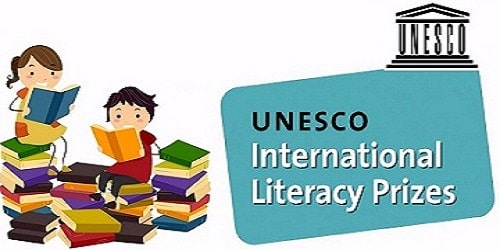On September 2, 2019, Audrey Azoulay, the Director-General (DG) of United Nations Educational, Scientific and Cultural Organization (UNESCO) announced the winners of UNESCO International Literacy Prizes 2019.
i. The International jury, which recommended the prizes, comprised of John Benseman (New Zealand), Rana Dajani (Jordan), Ms. Jianhong Dong (People’s Republic of China), Sowonne Tchang (Republic of Korea) and Dr. Willy Ngaka (Uganda).
ii. The awards were distributed by the Director-General in a ceremony at UNESCO Headquarters-Paris on September 9, 2019 on the occasion of International Literacy Day (ILD) 2019 (Theme-Literacy and Multilingualism).
Awards
| UNESCO King Sejong Literacy Prize | |
| Awardee | Programme |
| National Office of Literacy and Education for Adults (ONAEA), Algeria | National Strategy for Multilingual Literacy |
| Textile Fibres and Development Company (SODEFITEX), Senegal | Functional literacy and follow-up vocational training for farmers in southern Senegal in national languages |
| UNESCO Confucius Prize for Literacy | |
| Awardee | Programme |
| Camacol Antioquia, Colombia | Obras Escuala |
| BASAbali, Indonesia | BASAbali Wiki |
| Nuovo Comitato il Nobel per I Disabili, Italy | TELL ME – Theatre for Education and Literacy Learning of Migrants in Europe |
About the awardees:
i. ONAEA
The National Office of Literacy and Education for Adults (ONAEA) of the Algerian Ministry of Education was awarded UNESCO King Sejong Literacy Prize for its ‘National Strategy for Multilingual Literacy’ programme.
- ONAEA’s ‘National Strategy for Multilingual Literacy’ programme was launched in 2016 in support of the implementation of the 2008 National Strategy for Literacy after the adoption of Tamazight as the official national language in addition to Arabic.
- The strategy includes an 18-month literacy course for adults in both of the official languages.
- Director-General of ONAEA is Kamel Kherbouche.
ii. SODEFITEX
‘Textile Fibres and Development Company’(SODEFITEX) in Senegal was awarded UNESCO King Sejong Literacy Prize for its ‘Functional literacy and follow-up vocational training for farmers in southern Senegal in national languages’ programme.
- SODEFITEX started providing literacy courses in 1982 to farmers with limited or non-schooling in Southern Senegal as part of their work.
- The company aims at creating a literate environment by guiding the farmers benefiting from the programme, aged 20 to 45.
iii. Camacol Antioquia
‘Camacol Antioquia’ in Colombia was awarded UNESCO Confucius Prize for Literacy for its ‘Obras Escuala’ programme.
- The programme ‘Obras Escuela’ was launched in 2007, with the aim to promote literacy for workers in this sector.
- The Director of corporate social responsibility at Camacol Antioquia is María Lucía Vélez.
iv. BASAbali
‘BASAbali’in Indonesia was awarded UNESCO Confucius Prize for Literacy for its ‘BASAbali Wiki’ programme.
- BASAbali Wiki is a multimedia, multilingual (Balinese-Indonesian-English) wiki dictionary, encyclopedia and virtual library which intends to revitalize endangered local languages by creating a sense of ownership.
- The main target group of the programme is younger generations, especially young women and girls.
- The programme was launched in 2011.
- The Chair of the BASAbali Wiki Board is presided by Gde Nala Antara.
v. Nuovo Comitato il Nobel per I Disabili
‘Nuovo Comitato il Nobel per I Disabili’in Italy was awarded UNESCO Confucius Prize for Literacy for its ‘TELL ME – Theatre for Education and Literacy Learning of Migrants in Europe’ programme.
- Nuovo Comitato il Nobel per i Disabili (New Nobel Committee for People with Disabilities) is an Italian non-profit organization created by Nobel laureate, Mr Dario Fo, in 1997 to support disadvantaged groups through education, with particular regard to disabled people.
- In 2016, the committee decided to focus its efforts on the migrant population and launched the programme ‘Tell Me’, an acronym for ‘Theatre for Education and Literacy Learning of Migrants in Europe’.
- The programme is operating in Italy, Portugal, Spain, and Turkey.
About awards:
- UNESCO King Sejong Literacy Prize – Established in 1989, with the support of the Government of the Republic of Korea, it gives special consideration to the development and use of mother-tongue literacy education and training.
- UNESCO Confucius Prize for Literacy – The UNESCO Confucius Prize for Literacy, established in 2005, with the support of the Government of the People’s Republic of China. It gives special consideration to literacy amongst adults in rural areas and out-of-school youth, particularly girls and women.
Prize money – Each of the five prize winners receives a medal, a diploma and US$20.000.
About UNESCO:
♦ Headquarters: Paris, France
♦ Founded: November 4, 1946




